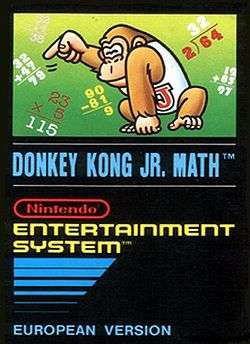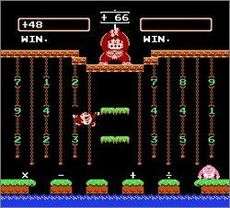Donkey Kong Jr. Math
| Donkey Kong Jr. Math | |
|---|---|
 European box art | |
| Developer(s) | Nintendo Research & Development 2 |
| Publisher(s) | Nintendo |
| Series | Donkey Kong |
| Platform(s) | Nintendo Entertainment System |
| Release date(s) | |
| Genre(s) | Edutainment, platforming |
| Mode(s) | Single-player, multiplayer |
Donkey Kong Jr. Math, originally released in Japan as Donkey Kong Jr.'s Math Play (Japanese: ドンキーコングJR.の算数遊び Hepburn: Donkī Kongu Junia no Sansū Asobi) (sometimes released as Jr. Math Lesson (JR.算数レッスン Junia Sansū Ressun)), is a Nintendo edutainment video game where players must solve math problems in order to win. It was released in Japan in 1983 for the Family Computer, in North America for the NES's nationwide launch in 1985, and in PAL regions in 1986. It is the only game in the "Education Series" of NES games in North America. Donkey Kong Jr. Math was made available in the video game Animal Crossing (along with several other NES titles). Donkey Kong Jr. Math was re-released on the Wii's Virtual Console in 2007 and on the Wii U's Virtual Console in 2014.
Since its release, Donkey Kong Jr. Math has received very negative reception; Nintendo spokesman Tom Sarris commented that it was not well received, resulting in Nintendo ceasing development of educational games for the time. It was noted as one of the worst launch video games ever made by publications such as Electronic Gaming Monthly and 1UP.com. It has also received criticism from several publications including IGN, who called it one of the worst Virtual Console games. The game was the worst-selling game in the NES's launch library in the US.
Gameplay

The game features one and two player modes, both of which are single screen. In the first mode, the objective is to enter math answers in order to receive points. These questions include addition, subtraction, multiplication, and division. In the two player mode, two players control two characters as they race to create a math formula to reach the number shown by Donkey Kong, incorporating platform gameplay. The mechanics are similar to Donkey Kong Jr.; players climb vines to reach higher areas in order to collect numbers scattered around the area. In order to complete mathematics problems, players must collect at least three things: the first number, the symbol necessary to reach the number shown by Donkey Kong, and the second number. When the game features a high number, such as 66, players must collect multiple numbers and mathematics symbols in order to reach this. For example, players could choose a nine, a multiplication symbol, and a seven, followed by an addition symbol and a three to reach the number 66. The two player game have two different levels, Calculate A and Calculate B. Calculate B is more challenging: Donkey Kong can ask for negative numbers, and the absolute values of the target numbers are in the hundreds instead of the tens.
Release
Donkey Kong Jr. Math was developed and published by Nintendo for the Nintendo Entertainment System (NES). It was first released in Japan on December 12, 1983, and was released shortly after as JR. Math Lesson together with Donkey Kong Jr. as Nintendo's first licensed multicart (released in a bundle together with Sharp's C1 NES TV).[2] Donkey Kong Jr. Math was released for the NES in North America and Europe in 1986. It is the only entry in the "Education Series" of NES games released in North America.[3] In August 1995, the Sharp multicart was re-released separately from the C1 NES TV.[2] The game has been released on other platforms, including the video game Animal Crossing, which featured several NES games.[4] Donkey Kong Jr. Math was re-released on the Wii's Virtual Console in Japan on March 27, 2007,[5] Europe and Australia on April 20, 2007, and in North America on September 3, 2007. It was re-released again for the Wii U's Virtual Console in North America on August 28, 2014, in Europe on January 22, 2015, and in Japan on April 15, 2015.[6]
Reception
| Reception | ||||||||||||||
|---|---|---|---|---|---|---|---|---|---|---|---|---|---|---|
| ||||||||||||||
Since its release for the NES, Donkey Kong Jr. Math has been a critical and commercial disappointment. GameRankings reports an aggregate score of 32%, based on 5 reviews.[7] It was the worst-selling launch title for the NES.[10] Nintendo spokesman Tom Sarris said that it "wasn't a big hit", adding that no one was very enthusiastic about the title. He felt that if it had been received better, it would have led to more educational titles.[11] Author Andy Slaven, writing in the Video Game Bible, criticized the premise, deriding Nintendo for combining a well-liked license with math, which is generally disliked by children.[12] Inside Higher Ed's David Epstein did not find it to be a fun game,[10] while 1UP.com's Bob Mackey called it the worst NES launch title, criticizing it for its lack of value. He commented that Donkey Kong Jr. moves as well as an infant would in real life.[13]
Donkey Kong Jr. Math had a poor reception from IGN, with Lucas M. Thomas finding its controls poor and its execution to be bland and flawed,[3] while AU's Cam Shea said it would be "too expensive if it was free".[14] Shea also included it on his list of the worst Virtual Console games, finding it difficult to imagine any reason why anyone would want to buy it.[15] GameSpot's Frank Provo found that it became boring quickly, also criticizing the mathematics problems for being either too easy for young children or too boring for older ones.[9] Eurogamer's Dan Whitehead commented that it gave him an "ironic smile" as a reminder of the NES era, though he could not justify paying five dollars for it.[16]
Donkey Kong Jr. Math has received criticism for its qualities as an educational game. Elizabeth Sweedyk, associate computer science professor at Harvey Mudd College, called Donkey Kong Jr. Math a realistic educational video game, criticizing such games as "not fun."[10] 1UP.com's Kevin Gifford called it a game that children would never want to play.[17] Fellow 1UP.com writer Jeremy Parish commented that the game shouldn't be judged on being an educational game, citing quality educational titles as The Oregon Trail and Where in the World Is Carmen Sandiego?. However, he noted that it should be judged for being a boring game.[18] Ars Technica's Frank Caron compared it to other educational games, calling it "no Brain Age" and preferring to play Math Blaster instead.[19] Educational video game developer Traci Lawson wondered whether the word game Bookworm would have been as well received by players when they were children; she felt that they would be intimidated by it, comparing this to how she felt when she played Donkey Kong Jr. Math.[20] In contrast to the negative reception, Allgame's Skyler Miller called it a creative use of Donkey Kong Jr.'s graphics and gameplay.[8]
References
- ↑ "Donkey Kong Jr. Math : instruction booklet.". U.S. Copyright Office. 1986-06-16. Retrieved 2015-05-07.
- 1 2 NEWSCLUB Premium Goods プレミアム グッズ - プレミア付、ってだけで興味あるでしょ? : 金では売れん自慢の一品. Famicom Tsūshin. No.347. Pg.179. 11 August 1995.
- 1 2 Lucas M. Thomas (2007-09-06). "Donkey Kong Jr. Math Review - Wii Review at IGN". IGN. Retrieved 2010-10-15.
- ↑ "Donkey Kong Jr. Math (GameCube Download) - Game Boy Advance - GameSpy". GameSpy. Retrieved 2010-10-15.
- ↑ "VC ドンキーコングJR.の算数遊び" (in Japanese). Nintendo. Retrieved May 30, 2015.
- ↑ "ドンキーコングJR.の算数遊び" (in Japanese). Nintendo. Retrieved May 30, 2015.
- 1 2 Donkey Kong Jr. Math for Nes. GameRankings. Retrieved August 11, 2013.
- 1 2 Miller, Skyler. "Donkey Kong Jr. Math - Overview". Allgame. Archived from the original on 2010-01-02. Retrieved May 29, 2013.
- 1 2 Provo, Frank (2007-09-03). "Donkey Kong Jr. Math Review for Wii". GameSpot. Archived from the original on 2007-09-15. Retrieved 2010-10-15.
- 1 2 3 David Epstein (2005-10-26). "News: Joystick Nation - Inside Higher Ed". Inside Higher Ed. Retrieved 2010-10-15.
- ↑ Young Nintendo Fans Want Fun, Not Lessons. Los Angeles Times. 1990. p. 102. Retrieved 2010-10-15.
- ↑ Slaven, Andy (2004). Video Game Bible, 1985-2002. Trafford Publishing. p. 102. Retrieved 2010-10-15.
- ↑ Bob Mackey. "The Most Explosively Awful Console Launch Titles from 1UP.com". 1UP.com. Retrieved 2010-10-15.
- ↑ Shea, Cam (2007-04-23). "Virtual Console AU Buyer's Guide - Part 4 - Wii Feature at IGN". IGN. Retrieved 2010-10-15.
- ↑ Shea, Cam (2008-08-07). "The Worst Games on Virtual Console: Part 1 - Wii Feature at IGN". IGN. Retrieved 2010-10-15.
- ↑ Dan Whitehead (2007-06-02). "Virtual Console Roundup Wii Review - Page 3". Eurogamer. Retrieved 2010-10-15.
- ↑ "Wrecking Crew (Famicom Mini 14) Review for from 1UP.com". 1UP.com. Retrieved 2010-10-15.
- ↑ Jeremy Parish (2007-11-19). "Retro Roundup: 1st Anniversary Edition - Sonic, Zonk, Wrecking Crew: News from 1UP.com". 1UP.com. Retrieved 2010-10-15.
- ↑ Caron, Frank (2007-09-03). "Virtual Console Monday (9-03-07): a labor day foursome". Ars Technica. Retrieved 2010-10-15.
- ↑ Daniel Johnson (2009-08-25). "News - Analysis: The Fun Of Language Development with Bookworm Adventures". Gamasutra. Retrieved 2010-10-15.
External links
- Official Nintendo Wii Virtual Console Minisite (Japanese)
- Official Nintendo Wii Minisite (English)
- Official Nintendo Wii U Minisite (English)
- Donkey Kong Jr. Math at MobyGames